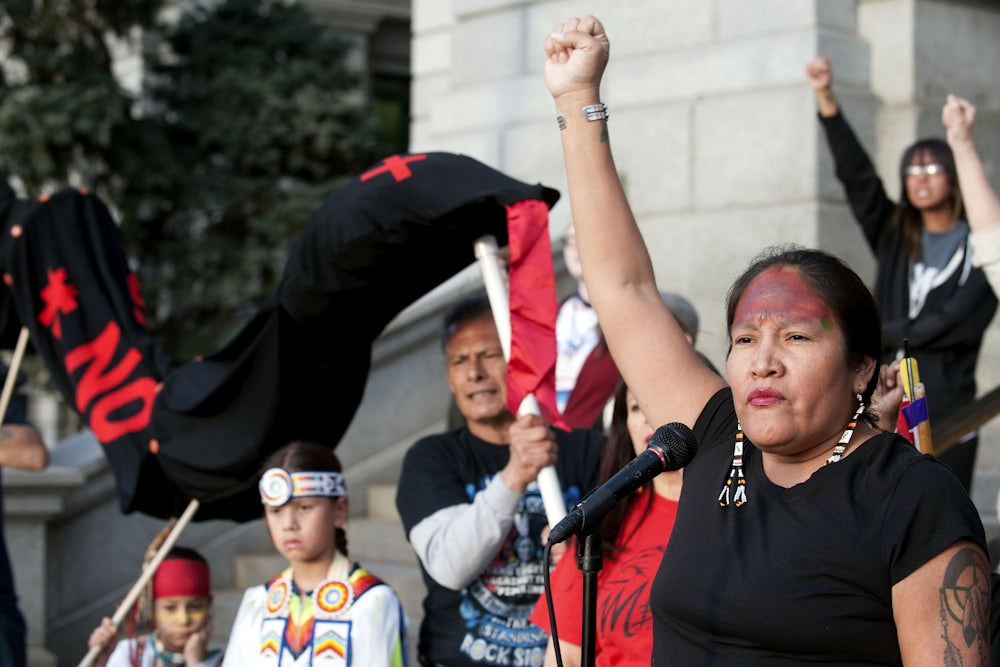On Wednesday, TC Energy, the Canadian company backing the Keystone XL pipeline, announced the official cancellation of the controversial project. The decision is the culmination of years of Indigenous organizing, and it stands as one of the most significant climate accomplishments in the Biden administration’s young term.
Among President Biden’s first actions upon taking office in January included reaffirming the nation-to-nation relationship the United States holds with the sovereign tribal nations of this land, and revoking the federally issued permits for the Keystone XL pipeline. The permits had been bandied about in a game of political ping-pong for the past six years, first being rejected by President Obama and then approved by President Trump, who, along with Republicans in Congress, heralded the pipeline’s temporary construction jobs as some sort of economic blessing. With TC Energy conceding defeat over its pipeline, it’s only natural for environmentalists and Native activists to celebrate. But if the White House intends to uphold its commitment to Indian Country, the day of celebration should be the first of many to come.
The Keystone XL pipeline, planned to run from Alberta to Nebraska, with the petroleum then routed for the Gulf of Mexico, is only partially constructed at this point due to its legal and political instability. In Canada, the Associated Press recently reported that the government of Alberta has already dumped upward of $1 billion into supporting its full construction, while Canadian Prime Minister Justin Trudeau has remained an avid supporter of Keystone XL despite Indigenous resistance. On this side of the border, since its introduction onto the national stage, Keystone XL was vociferously opposed by the Oglala Lakota Nation and the Cheyenne River Sioux Tribe. Following Biden’s permit cancellation in January, CRST Chairman Harold Frazier issued a lengthy statement in support, thanking Biden for “acknowledging the danger this project poses to our land and to our people,” and considering the action an example of the U.S. honoring the 1851 and 1868 Fort Laramie treaties it signed with the Great Sioux Nation.
The same day the pipeline was nixed, an important court decision came down in the cases of two CRST citizens facing charges for protesting the pipeline. Oscar High Elk and Jasilyn Charger helped organize a camp to protest Keystone XL, where they were calling for the full removal of the already constructed sections. Charger had been brought up on charges by Haakon County state’s attorney Stephanie Trask for allegedly chaining herself to a pump station; on Wednesday, she avoided jail time by pleading no contest and agreeing to pay a $531 fine. (High Elk’s court date was pushed back; he faces a litany of charges brought by the state for his participation in the protest efforts.)
This has been the reality for Indigenous water protectors fighting pipelines across the continent, particularly as conservative state legislatures have passed laws allowing for increasingly violent treatment and increasingly harsh prosecution of protesters. As with the case of the Atlantic Coast Pipeline, a combination of constant legal challenges and fractured political support is what ultimately killed Keystone. But the driving forces behind those were the people standing on the front lines, enduring a coalition of local, state, and federal police forces all intent on protecting what they deem “critical infrastructure.”
Blocking the operation or construction of oil and gas pipelines—and moving away from fossil fuel infrastructures and energy models—is precisely what the federal government must do in order to sustain our planet’s long-term health. What the Keystone cancellation cannot be treated as, however, is a destination or end point. Keystone was never a particularly necessary or even financially feasible project with regard to the nation’s immediate energy needs, which is why both Obama and now Biden were happy to oppose it. The true test of the Biden administration—one that Obama initially failed—is whether the death of Keystone marks the beginning or the end of its commitment to rapidly transitioning the nation away from these operations writ large. Dakota Access and Line 3 have yet to face the kind of scrutiny from the White House that Keystone received.
Earlier this week, Line 3 protesters were subjected to a low flyover maneuver conducted by a Customs and Border Patrol helicopter reportedly called in by local police. Standing Rock camp participants face increasingly ridiculous charges and jail sentences by overzealous prosecutors. Indigenous water protectors and allies are risking their lives and futures while the federal government allows these pipelines to cut through Native lands. That the White House assisted them in the Keystone XL fight is a sign that the Biden administration knows it’s empowered to chart a course for a future full of good-faith relationships with tribal nations. Now it needs to wield that power again, and then again, and then again—until news items like pipeline cancellations cease to be days of celebration and rejoicing, and start just becoming another day that ends in -y.








